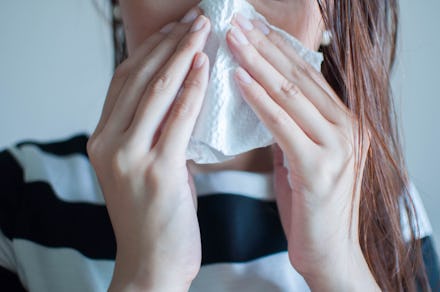Every time I sneeze, I think I have coronavirus

I have allergies. Most mornings, I wake up with at least some sort of discomfort in my nose and throat. This has been true for years, and I have mostly dealt with it by taking OTC allergy meds and accepting my runny nose as an uncomfortable — but inevitable — part of life. This year has been different, though. Every time I have any kind of symptoms, I’m sure I have COVID-19, which is basically every damn day. Am I becoming a pandemic hypochondriac?
“The world is on fire — we’re all experiencing some kind of worry or anxiety,” says Matthew Mutchler, psychotherapist and associate professor of counseling psychology at Delaware Valley University. “It makes sense for anxiety to come out as worry about a cough or a headache.” In other words, not only is my COVID-19 paranoia kind of normal, it’s also probably about more than just the pandemic. Weirdly, but it may be a helpful coping mechanism.
“On top of the pandemic, we’ve had a year of civil unrest, a tumultuous election, an attempted coup, and whatever else has happened in our personal lives,” Mutchler explains. “A symptom that might be COVID-19 provides us something to focus our worry on. Everything else is so far out of our control, this seems more manageable, even if it comes with anxiety of its own.”
Basically, since I’m an anxious mess about the state of the world and thinking about all the giant systemic problems makes me feel overwhelmed and helpless, my brain may be refocusing all my anxiety into COVID-paranoia. It’s not fun, but it is something that can be quickly diagnosed and dealt with. Unlike, say, white supremacy. “For the overwhelming majority of people, this is not hypochondria, but responding with an expected amount of heightened anxiety during a strange and stressful time,” says Mutchler.
All of this to say that I will not feel like this forever. As Mutchler points out, the kind of anxiety we have now is different from the anxiety we had in the before time. “We can’t compare ‘excessive worry’ over the past year to the same level of worry before the pandemic,” he says. “We have been in a heightened state of awareness/alertness to our behavior and symptoms for the past year.” I hesitate to use the term “trauma” lightly, but what we’ve all been through in the past year may be akin to experiencing an extended low level of trauma, and our bodies can’t help but respond.
“Many people’s limbic systems are working in ‘survival mode’ — which often is associated with trauma and heightened anxiety,” says Mutchler. Heightened awareness leads to heightened reactivity, he says, like obsessive temperature checking. Often when we think about trauma responses, we consider stimuli outside of the person — loud noises, particular smells, etc, Mutchler says. But with anxiety in the time of coronavirus, we are constantly monitoring our internal environments for risk. And because our bodies are complex ecosystems with constantly changing weather patterns, it’s real easy to detect a subtle shift and go into emergency mode.
“With COVID-19, the symptoms we experience are completely internal, so that anxiety gets triggered all the more easily,” he explains. COVID-19 paranoia, then, is the brain’s way of dealing with the overstimulation of the nervous system. We live in a world with many external threats right now that we can’t run away from, but we’re also stuck spending a lot of time alone a little too in touch with our own inner workings, so our brain looks for threats on the inside, and it’s not hard for it to find them.
The other thing is that this is a crucial moment not to judge the ways we — or others — cope, especially if those coping behaviors could, actually, help prevent the spread of the virus. “I’ve been telling people not to worry about whether they’re experiencing a symptom of mental illness or just being hypervigilant about something like washing hands, since right now it’s protective,” says says Dulcinea Pitagora, a New York City-based psychotherapist. “Down the road we can address the symptoms when it’s easier to separate a symptom from how we’re protecting ourselves in the current reality.” So if you — like me — need to take your temperature every day and get tested more often than necessary in order to feel sane, go right ahead.